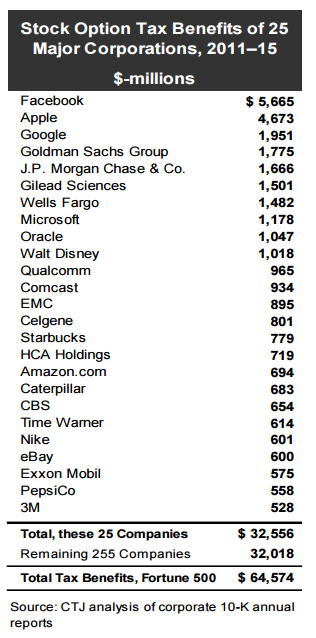Facebook, Apple and Google are even better than the giants of Wall Street when it comes to taking advantage of massive tax write-offs, according to a new analysis by Citizens for Tax Justice.
The group examined financial reports filed by 315 Fortune 500 companies and determined that the three tech giants are the biggest beneficiaries of a rule that allows companies to deduct from their earnings the value of stock options granted to their executives, thereby reducing their tax liability.
“Most big corporations give their executives (and sometimes other employees) options to buy the company’s stock at a favorable price in the future,” the report says. “When employees exercise these options, corporations can take a tax deduction for the difference between what the employees pay for the stock and what it’s worth (employees report this difference as taxable wages).”
Related: Corporate America Is Sending a $6.6 Trillion Recession Signal
Facebook, by far the biggest beneficiary of the tax dodge, reduced its tax bill by $5.7 billion between 2011 and 2015, according to the CTJ analysis. “Over the past five years, Facebook slashed its federal and state income taxes by 70 percent using this single tax break,” the report says.
Apple wasn’t far behind, slashing its obligations by $4.7 million, while Google ranked third with $1.9 billion in savings. Investment bank Goldman Sachs and financial services giant J.P. Morgan Chase rounded out the top five, with savings of $1.8 billion and $1.7 billion, respectively.
What bothers the activists at CTJ is that the giant write-offs enjoyed by companies that issue stock options come despite there being no actual outlay of cash, meaning that companies can deduct costs that they don’t actually have to pay. CTJ explains that the rules now allow companies to use different values for the options when they account for them in their booked profits and in their tax filings:
“[T]he book write-offs are usually much less than what the companies take as tax deductions. This is because the oddly designed rules require the value of the stock options for book purposes to be calculated — or guessed at — when the options are issued, while the tax deductions reflect the actual value when the options are exercised.
“Because companies typically low-ball the estimated values, they usually end up with much bigger tax write-offs than the amounts they deduct as a ‘cost’ in computing the profits they report to shareholders.”
Related: El-Erian Says the Global Economy Needs Governments to Step Up
The write-offs result in significantly lower revenue for the Treasury Department. According to CTJ’s analysis, that single break reduced the tax bill of Fortune 500 companies by $14.9 billion in 2015. In the five years between 2011 and 2015, the Fortune 500 saved a collective $64.6 billion. Of that, about half went to just 25 companies:






